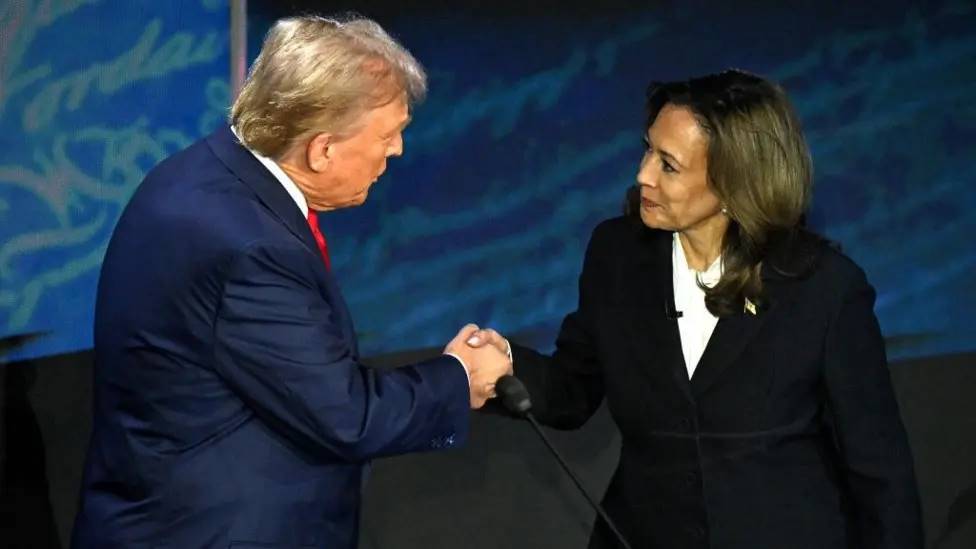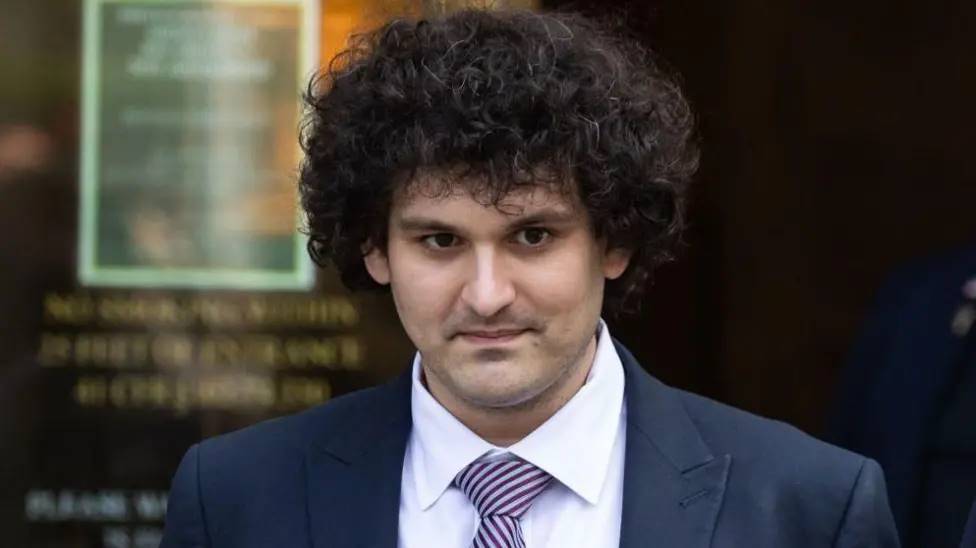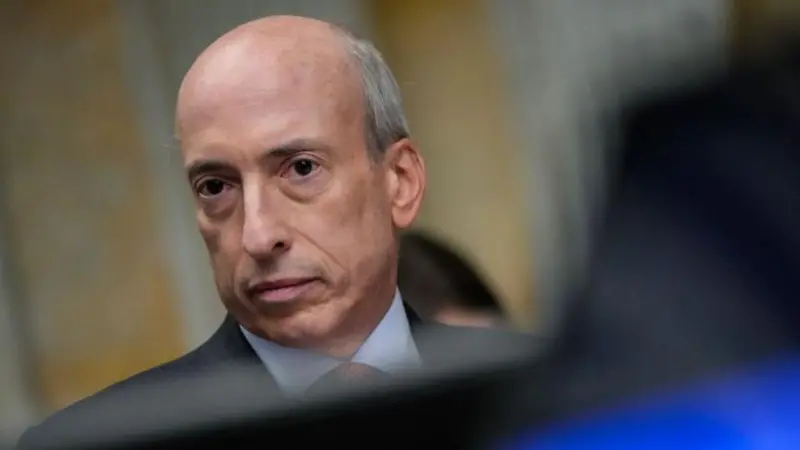Trump has promised to make the United States the "global capital of cryptocurrency" and to create a "national strategic Bitcoin reserve" similar to the US government's gold reserve to win the votes of cryptocurrency enthusiasts.
Author: Jonathan Josephs
Translation: DeepTechFlow

While Trump's views on cryptocurrency are very clear, Harris's position is not so clear.
"The cryptocurrency industry is 'full of fraud, charlatans, and scammers,'" the head of one of the United States' top financial regulatory agencies told the BBC.
Gary Gensler, chairman of the US Securities and Exchange Commission (SEC), said, "Global investors have lost too much money because cryptocurrency companies have not complied with the laws that institutions are trying to enforce."
This statement was made in the context of the industry spending millions of dollars on political donations, attempting to influence the outcome of the November US elections in hopes of obtaining more favorable legal backgrounds.
In addition to the presidential election between Donald Trump and Kamala Harris, all 435 districts of the House of Representatives will also be up for re-election, as well as 33 of the 100 Senate seats.
The future of cryptocurrency is one of the most debated technologies globally, and there seems to be a clear disagreement between Donald Trump and the outgoing Biden administration.
Trump has promised to make the United States the "global capital of cryptocurrency" and to create a "national strategic Bitcoin reserve" similar to the US government's gold reserve to win the votes of cryptocurrency enthusiasts.
Last week, he launched a new cryptocurrency company, called World Liberty Financial, and although he provided few details, he said, "I think cryptocurrency is one of the things we must do."
This represents a huge reversal from three years ago when he viewed Bitcoin as "looking like a scam" and a threat to the US dollar.
Trump's newfound enthusiasm stands in stark contrast to the Biden administration, of which Harris is the vice president. In recent years, the White House has launched a comprehensive crackdown on cryptocurrency companies.
In March, Sam Bankman-Fried, founder and CEO of FTX, was sentenced to 25 years in prison for fraud, having stolen billions of dollars from global customers, many of whom are still trying to recover their money.
Then in April, Zhao Changpeng, founder of the world's largest cryptocurrency exchange Binance, was sentenced to four months in prison, and the company paid a $4.3 billion (£3.2 billion) fine. He admitted to allowing criminals, child abusers, and terrorists to register for money laundering on his platform, a case brought by the US Department of Justice.
The US Securities and Exchange Commission (SEC) has also filed a lawsuit against Binance. Last year, the financial regulatory agency took a record 46 enforcement actions against companies trying to profit from this emerging technology.

The imprisonment of cryptocurrency boss Sam Bankman-Fried reflects the worst aspects of the cryptocurrency industry.
"This is a developed field, and just because they record their cryptocurrency assets on new accounting ledgers, they [wrongly] say 'we don't want to comply with time-tested laws,'" Gensler said.
He explained that since the establishment of the SEC, companies seeking to raise funds from the public have always been required to "share certain information" with them, rules aimed at protecting investors.
This can be traced back to 1934, marking the beginning of the Great Depression, following the infamous Wall Street crash of 1929.
"Cryptocurrency accounts for only a small portion of the US and global capital markets, but it could undermine the trust of ordinary investors in the capital markets," Gensler said.
Despite supporters' belief that cryptocurrency offers a fast, cheap, and secure way to transfer funds, a survey by the US central bank, the Federal Reserve, found that the number of Americans using cryptocurrency dropped from 12% in 2021 to 7% last year.
Harris has not spoken much about cryptocurrency, but one of her advisors said last month that she would "support policies that ensure the continued development of emerging technologies and the industry."
Recent meetings between her team and industry executives aimed to build trust and bring hope to cryptocurrency bosses, regardless of who wins in November, for a brighter future.
"I cannot overstate the importance of this, not only for the United States but for the whole world," said Paul Grewal, chief legal officer of cryptocurrency company Coinbase, who attended these meetings.
"The United States is not only an important market for cryptocurrency, but also an important place for the development of crucial cryptocurrency technology. I think we must realize that the rest of the world is not waiting quietly for the United States to sort out its own affairs."
He added that given the intense competition in the White House race, "every vote will be important, and cryptocurrency votes are no exception."

Gary Gensler, chairman of the US Securities and Exchange Commission (SEC), has been highly critical of some cryptocurrency companies.
This year, the US crackdown on cryptocurrency has resonated in Europe. In April, the European Union reached new legislation aimed at reducing the risk of cryptocurrency being used by criminals.
However, the actions of other regulatory agencies have been slower. The Group of Twenty (G20) is developing minimum standards for cryptocurrency, but these standards are not legally binding and progress in implementation has been slow.
In the United States, a bill to regulate cryptocurrency has been passed by the House of Representatives, but has not yet been passed by the Senate. Critics argue that this will reduce consumer protection.
Grewal of Coinbase supports the bill and said, "This industry has not shied away from regulation." He added that the industry simply wants to apply the same standards to cryptocurrency as to other assets, "not stricter, but not looser either."
With the November US elections approaching, the cryptocurrency industry is feeling an opportunity to elect legislators sympathetic to the industry.
By last month, the industry had already spent a record $119 million on donations, according to research by the nonprofit organization Public Citizen.
Rick Claypool, research director of the consumer rights group, said the money was being used to "help elect candidates who support cryptocurrency and attack critics of cryptocurrency, regardless of political stance."
He added that their spending on corporate donations exceeded that of any other industry, as they sought to make the US Congress yield to their demands for reduced regulation and weakened consumer protection.
免责声明:本文章仅代表作者个人观点,不代表本平台的立场和观点。本文章仅供信息分享,不构成对任何人的任何投资建议。用户与作者之间的任何争议,与本平台无关。如网页中刊载的文章或图片涉及侵权,请提供相关的权利证明和身份证明发送邮件到support@aicoin.com,本平台相关工作人员将会进行核查。




